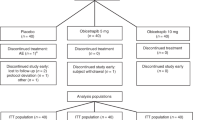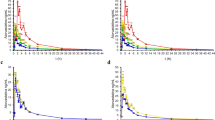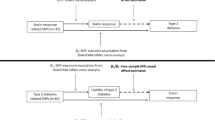Abstract
Statin therapy response is highly variable. Variants of lipid metabolism genes and statin pharmacokinetic modulators could play a role, however, the impact of most of these variants remains unconfirmed. A prospective and multicenter study included 252 patients was carried out in order to assess, according to achievement of LDL-C or non-HDL-C therapeutic targets and quantitative changes in lipid profiles, the impact of CETP, ABCA1, CYP2D6, and CYP2C9 gene candidate variants on the simvastatin, atorvastatin, and rosuvastatin response. Patients carrier ABCA1 rs2230806 and CYP2D6*3 variants are less likely to achieve therapeutic lipid targets (p = 0.020, OR = 0.59 [0.37, 0.93]; p = 0.040, OR = 0.23 [0.05, 0.93], respectively). Among CETP variants, rs708272 was linked to a 10.56% smaller reduction in LDL-C with rosuvastatin (95% CI = [1.27, 19.86] %; p = 0.028). In contrast, carriers of rs5882 had a 13.33% greater reduction in LDL-C (95% CI = [25.38, 1.28]; p = 0.032). If these findings are confirmed, ABCA1, CYP2D6, and CETP genotyping could be used to help predict which statin and dosage is appropriate in order to improve personalized medicine.
This is a preview of subscription content, access via your institution
Access options
Subscribe to this journal
Receive 6 print issues and online access
$259.00 per year
only $43.17 per issue
Buy this article
- Purchase on Springer Link
- Instant access to full article PDF
Prices may be subject to local taxes which are calculated during checkout

Similar content being viewed by others
References
Chasman DI, Giulianini F, MacFadyen J, Barratt BJ, Nyberg F, Ridker PM. Genetic determinants of statin-induced low-density lipoprotein colesterol reduction: The Justification for the Use of Statins in Prevention: an Intervention Trial Evaluating Rosuvastatin (JUPITER) trial. Circ Cardiovasc Genet. 2012;5:257–64.
Davidson MH, Toth PP. Comparative effects of lipid-lowering therapies. Prog Cardiovasc Dis. 2004;47:73–104.
Verschuren JJW, Trompet S, Wessels JAM, Guchelaar HJ, de Maat MP, Simoons ML, et al. A systematic review on pharmacogenetics in cardiovascular disease: is it ready for clinical application? Eur Heart J. 2012;33:165–75.
Thompson JF, Hyde CL, Wood LS, Paciga SA, Hinds DA, Cox DR, et al. Comprehensive whole-genome and candidate gene analysis for response to statin therapy in the treating to new targets (TNT) cohort. Circ Cardiovasc Genet. 2009;2:173–81.
Vrablík M, Hubáček JA, Dlouhá D, Lánská V, Rynekrová J, Zlatohlávek L, et al. Impact of variants within seven candidate genes on statin treatment efficacy. Physiol Res. 2012;61:609–17.
Munshi A. Genetic variation in MDR1, LPL and eNOS genes and the response to atorvastatin treatment in ischemic stroke. Hum Genet. 2012;131:1775–81.
Deepak Voora, Svati HS, Reed CR, Zhai J, Crosslin DR, Messer C, et al. Pharmacogenetic predictors of statin-mediated low-density lipoprotein cholesterol reduction and dose response. Circ Cardiovasc Genet. 2008;1:100–6.
Chasman DI, Posada D, Subrahmanyan L, Cook NR, Stanton VP Jr, Ridker PM. Pharmacogenetic study of statin therapy and cholesterol reduction. JAMA. 2004;291:2821–7.
Becker ML, Visser LE, van Schaik RH, Hofman A, Uitterlinden AG, Stricker BH. Common genetic variation in the ABCB1 gene is associated with the cholesterol-owering effect of simvastatin in males. Pharmacogenomics. 2009;10:1743–51.
Martin NG, Li KW, Murray H, Putt W, Packard CJ, Humphries SE. The effects of a single nucleotide polymorphism in SLCO1B1 on the pharmacodynamics of pravastatin. Br J Clin Pharmacol. 2012;73:303–6.
Postmus I, Trompet S, Deshmukh HA, Barnes MR, Li X, Warren HR, et al. Pharmacogenetic meta-analysis of genome-wide association studies of LDL cholesterol response to statins. Nat Commun. 2014;5:5068.
Ruiz-Iruela C, Padró-Miquel A, Pintó-Sala X, Baena-Díez N, Caixàs-Pedragós A, Güell-Miró R, et al. KIF6 gene as a pharmacogenetic marker for lipid-lowering effect in statin treatment. PLoS ONE. 2018;13:e0205430.
Feng Q, Wei-Qi W, Chung C, Levinson R, Bastarache L, Joshua C, et al. The effect of genetic variation in PCSK9 on the LDL-cholesterol response to statin therapy. Pharmacogenomics J. 2017;17:204–8.
Ference BA, Kastelein JJP, Ginsberg HN, Chapman MJ, Nicholls SJ, Ray KK, et al. Association of genetic variants related to CETP inhibitors and statins with lipoprotein levels and cardiovascular risk. JAMA. 2017;318:947–56.
Li YY, Zhang H, Qin XY, Lu XZ, Yang B, Chen ML. ATP-binding cassette transporter A1 R219K polymorphism and coronary artery disease in Chinese population: a meta-analysis of 5,388 participants. Mol Biol Rep. 2012;39:11031–9.
Tall AR. Functions of cholesterol ester transfer protein and relationship to coronary artery disease risk. J Clin Lipidol. 2010;4:389–93.
Rocha KC, Pereira BMV, Rodrigues AC. An update on efflux and uptake transporters as determinants of statin response. Expert Opin Drug Metab Toxicol. 2018;14:613–24.
Kashani Farid MA, Azizi F, Hedayati M, Daneshpour MS, Shamshiri AR, Siassi F. Association between CETP Taq1B and LIPC −514 C/T polymor- phisms with the serum lipid levels in a group of Tehran’s population: a cross sectional study. Lipids Health Dis. 2010;9:96.
De Haan W, van der Hoogt CC, Westerterp M, Hoekstra M, Dallinga-Thie GM, Princen HM, et al. Atorvastatin increases HDL cholesterol by reducing CETP expression in cholesterol-fed APOE*3-Leiden.CETP mice. Atherosclerosis. 2008;197:57–63.
Regieli JJ, Jukema JW, Grobbee DE, Kastelein JJ, Kuivenhoven JA, Zwinderman AH, et al. CETP genotype predicts increased mortality in statin-treated men with proven cardiovascular disease: an adverse pharmacogenetic interaction. Eur Heart J. 2008;29:2792–9.
Carlquist JF, Muhlestein JB, Horne BD, Hart NI, Bair TL, Molhuizen H, et al. The cholesteryl ester transfer protein Taq1B gene polymorphism predicts clinical benefit of statin therapy in patients with significant coronary artery disease. Am Heart J. 2003;146:1007–14.
Boekholdt SM, Thompson JF. Natural genetic variation as a tool in understanding the role of CETP in lipid levels and disease. J Lipid Res. 2003;44:1080–93.
Anagnostopoulou K, Kolovou G, Kostakou P, Mihas C, Mikhailidis D, Cokkinos DV. Pharmacogenetic study of cholesteryl ester transfer protein gene and simvastatin treatment in hypercholesterolaemic subjects. Expert Opin Pharmacother. 2007;8:2459–63.
Ma XY, Liu JP, Song ZY. Associations of the ATP-binding cassette transporter A1 R219K polymorphism with HDL-C level and coronary artery disease risk: a meta-analysis. Atherosclerosis. 2011;215:428–34.
Lu Z, Luo Z, Jia A, Yu L, Muhammad I, Zeng W, et al. Associations of the ABCA1 gene polymorphisms with plasma lipid levels: a meta-analysis. Medicine. 2018;97:e13521.
Ghaznavi H, Aali E, Soltanpour MS. Association study of the atp-binding cassette transporter A1 (ABCA1) Rs2230806 genetic variation with lipid profile and coronary artery disease risk in an Iranian population. Open Access Maced J Med Sci. 2018;6:274–9.
Rejeb J, Omezzine A, Rebhi L, Boumaiza I, Kchock K, Belkahla R, et al. Associations between common polymorphisms of adenosine triphosphate-binding cassette transporter A1 and coronary artery disease in a Tunisian population. Arch Cardiovasc Dis. 2010;103:530–7.
Li J, Wang LF, Li ZQ, Pan W. Effect of R219K polymorphism of the ABCA1 gene on the lipidlowering effect of pravastatin in Chinese patients with coronary heart disease. Clin Exp Pharm Physiol. 2009;36:567–70.
Akao H, Polisecki E, Schaefer EJ, Trompet S, Robertson M, Ford I, et al. ABCA1 gene variation and heart disease risk reduction in the elderly during pravastatin treatment. Atherosclerosis. 2014;235:176–81.
Kitzmiller JP, Luzum JA, Dauki A, Krauss RM, Medina MW. Candidate-gene study of functional polymorphisms in SLCO1B1 and CYP3A4/5 and the cholesterol-lowering response to simvastatin. Clin Transl Sci. 2017;10:172–7.
Kitzmiller JP, Mikulik EB, Dauki AM, Murkherjee C, Luzum JA. Pharmacogenomics of statins: understanding susceptibility to adverse effects. Pharmacogenomics Personalized Med. 2016;9:97–106.
Neuvonen PJ, Backman JT, Niemi M. Pharmacokinetic comparison of the potential over-the-counter statins simvastatin, lovastatin, fluvastatin and pravastatin. Clin Pharmacokinet. 2008;47:463–74.
Buzková H, Pechandová K, Danzig V, Vareka T, Perlik F, Zak A, et al. Lipid-lowering effect of fluvastatin in relation to cytochrome P450 2C9 variant alleles frequently distributed in the Czech population. Med Sci Monit. 2012;18:CR512–17.
Fujino H, Saito T, Tsunenari Y, Kojima J, Sakaeda T. Metabolic properties of the acid and lactone forms of HMG-CoA reductase inhibitors. Xenobiotica. 2004;34:961–71.
Zuccaro P, Mombelli G, Calabresi L, Baldassarre D, Palmi I, Sirtori CR. Tolerability of statins is not linked to CYP450 polymorphisms, but reduced CYP2D6 metabolism improves cholesteraemic response to simvastatin and fluvastatin. Pharm Res. 2007;55:310–7.
Geisel J, Kivistö KT, Griese EU, Eichelbaum M. The efficacy of simvastatin is not influenced by CYP2D6 polymorphism. Clin Pharm Ther. 2002;72:595–6.
Banach M, Rizzo M, Toth PP, Farnier M, Davidson MH, Al-Rasadi K, et al. Position paper. Statin intolerance-an attempt at a unified definition. Position paper from an International Lipid Expert Panel. Arch Med Sci. 2015;11:1–23.
Ramsey LB, Johnson SG, Caudle KE, Haidar CE, Voora D, Wilke RA, et al. The clinical pharmacogenetics implementation consortium (CPIC) guideline for SLCO1B1 and simvastatin-induced myopathy: 2014 update. Clin Pharmacol Ther. 2014;96:423–8.
ACC/AHA Release Updated Guideline on the Treatment of Blood Cholesterol to Reduce ASCVD Risk. Am Fam Phys. 2014;90:260–5.
Third Report of the National Cholesterol Education Program (NCEP). Expert panel on detection, evaluation and treatment of high blood cholesterol in adults (adult treatment panel III) final report. Circulation. 2002;106:3143–421.
Friedewald WT, Levy RI, Fredrickson DS. Estimation of the concentration of low-density lipoprotein cholesterol in plasma, without use of the preparative ultracentrifuge. Clin Chem. 1972;18:499–502.
A global reference for human genetic variation. The 1000 Genomes Project Consortium. Nature. 2015;526:68–74.
Purcell S, Neale B, Todd-Brown K, Thomas L, Ferreira MAR, Bender D, et al. PLINK: a toolset for whole-genome association and population-based linkage analysis. Am J Hum Genet 2007;81:559–75. http://zzz.bwh.harvard.edu/plink/.
Crews KR, Gaedigk A, Dunnenberger HM, et al. Clinical Pharmacogenetics Implementation Consortium guidelines for cytochrome P450 2D6 genotype and codeine therapy: 2014 update. Clin Pharm Ther. 2014;95:376–82.
Barber MJ, Mangravite LM, Hyde CL, Chasman DI, Smith JD, McCarty CA, et al. Genome-wide association of lipid-lowering response to statins in combined study populations. PLoS ONE. 2010;5:e9763.
Phillips MC. Is ABCA1 a lipid transfer protein? J Lipid Res. 2018;59:749–63.
Liu Y, Tang C. Regulation of ABCA1 functions by signaling pathways. Biochim Biophys Acta. 2011;1821:522–9.
Zhao GJ, Yin K, Fu YC, Tang CK. The interaction of ApoA-I and ABCA1 triggers signal transduction pathways to mediate efflux of cellular lipids. Mol Med. 2012;18:149–58.
Niesor EJ, Schwartz GG, Perez A, Stauffer A, Durrwell A, Bucklar-Suchankova G, et al. Statin-induced decrease in ATP-binding cassette transporter A1 expression via microRNA33 induction may counteract cholesterol efflux to high-density lipoprotein. Cardiovasc Drugs Ther. 2015;29:7–14.
Gaedigk A, Ingelman-Sundberg M, Miller NA, Leeder JS, Whirl-Carrillo M, Klein TE, PharmVar Steering Committee. The pharmacogene variation (PharmVar) consortium: incorporation of the human cytochrome P450 (CYP) allele nomenclature database. Clin Pharm Ther 2018;103:399–401.
Li J, Wang X, Zhang Z, Zou J, Chen Y, Wang X, et al. Statin therapy correlated CYP2D6 gene polymorphism and hiperlipidemia. Curr Med Res Opin. 2014;30:223–8.
Dagostino C, Allegri M, Napolioni V, Bignami E, Mutti A, van Schaik RHN. CYP2D6 genotype can help to predict effectiveness and safety during opioid treatment for chronic low back pain: results from a retrospective study in an Italian cohort. Pharmgenomics Pers Med. 2018;11:179–91.
Cronin-Fenton DP, Lash TL. Clinical epidemiology and pharmacology of CYP2D6 inhibition related to breast cancer outcomes. Expert Rev Clin Pharmacol 2011;4:363–77.
Nieto-Ramirez I, Chegwin-Angarita C, Atehortúa L, Sepúlveda L. Statins: chemistry, analytical techniques, biosynthesis and pharmacokinetics. Vitae. 2013;20:49–63.
Thompson A, Di Angelantonio E, Sarwar N, Erqou S, Saleheen D, Dullaart RP, et al. Association of cholesteryl ester transfer protein genotypes with CETP mass and activity, lipid levels, and coronary risk. JAMA. 2008;299:2777–88.
Leusink M, Onland-Moret NC, de Bakker PI, de Boer A, Maitland-van der Zee AH. Seventeen years of statin pharmacogenetics: a systematic review. Pharmacogenomics. 2016;17:163–80.
Dachet C, Poirier O, Cambien F, Chapman J, Rouis M. New functional promoter polymorphism, CETP/-629, in cholesteryl ester transfer protein (CETP) gene related to CETP mass and high-density lipoprotein cholesterol levels: role of Sp1/Sp3 in transcriptional regulation. Arterioscler Thromb Vasc Biol 2000;20:507–15.
Acknowledgements
We thank Arnald Alonso-Pastor, Emili Corbella-Inglés, Ferran Trias-Vilagut, Marta Fanlo- Maresma, Hannia Elena Lafuente-González, Xavier Jusmet, and Enric Juncadella-García who provided insight and expertize that greatly assisted the research. We also would like to thank to Mollet Hospital (FSM, Mollet del Vallès, Spain) for their unstiting support in this project. The present work was performed as part of the Biochemistry, Molecular Biology and Biomedicine doctoral program of Cristina Ruiz-Iruela at Universitat Autònoma de Barcelona (Barcelona, Spain).
Fundings
This research was supported by Fundació Parc Taulí Institut Universitari UAB (Parc Taulí recerca scholarship 2012, CSPT/CIR/2012) and Fundación José Luis Castaño (FENIN scholarship 2014, JLC/FENIN/2014) from the Spanish Society of Laboratory Medicine (SEQC).
Author information
Authors and Affiliations
Corresponding author
Ethics declarations
Conflict of interest
The authors declare that they have no conflict of interest.
Additional information
Publisher’s note Springer Nature remains neutral with regard to jurisdictional claims in published maps and institutional affiliations.
Supplementary information
Rights and permissions
About this article
Cite this article
Ruiz-Iruela, C., Candás-Estébanez, B., Pintó-Sala, X. et al. Genetic contribution to lipid target achievement with statin therapy: a prospective study. Pharmacogenomics J 20, 494–504 (2020). https://doi.org/10.1038/s41397-019-0136-7
Received:
Revised:
Accepted:
Published:
Issue Date:
DOI: https://doi.org/10.1038/s41397-019-0136-7



